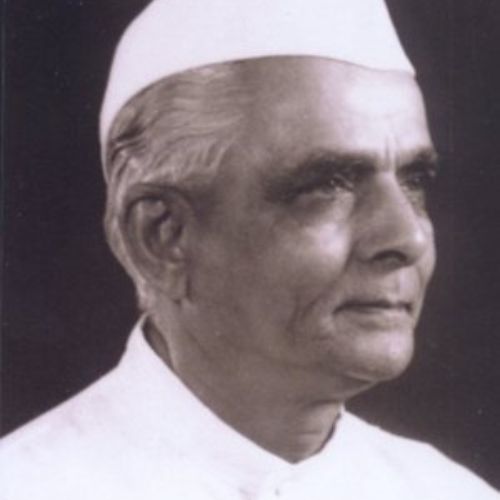Early Life
Ranganath Ramachandra Diwakar was born on 30 September 1894 in Dharwad, Karnataka. He completed his M.A. and L.L.B from Fergusson College in Pune and began working as a Professor of English. From 1916 to 1920, he taught English at Rajaram College (Kolhapur) and K.E. Society’s Arts College (Dharwad).
Role in India’s Independence Movement
Diwakar’s first foray into the freedom struggle happened quite early as a young school kid witnessing the 1905 Swadeshi movement. In a 1970 interview, he reminisces volunteering with the movement in an atmosphere permeated with patriotism and also shaped by larger world events. His interest in the fight for Swaraj was inspired by such events as Japan’s victory over Russia in 1905 and figures such as Éamon De Valera and Michael Collins of the Irish freedom struggle, and Giuseppe Mazzini and Giuseppe Garibaldi of the Italian nationalist movement.
The Non-cooperation Movement of the early 1920s spurred Diwakar to drop teaching and instead begin a career in journalism. In 1921, he founded Karmaveer, a Kannada weekly popular for its radical views and powerful language. This landed him in prison in 1923 for a year, under charges of sedition.
After being released from jail, Diwakar proceeded to work closely for the unification of the Kannada speaking regions spread throughout different provinces into a single administrative unit. In fact, he was the sole member of the Karnataka Provincial Congress Committee to represent the case for uniting Karnataka to the Nehru Committee set up to draft a constitution in 1928. The following year he took up the cause of spreading the use of Hindi and Khadi as part of a larger movement towards national integration. He was subsequently made the President of Dharwad’s Hindi Prachar Sabha. Throughout his life, Diwakar remained a close follower of Gandhi and his teachings, maintaining correspondence with him on the ways and means to take forward the freedom struggle.
Diwakar became the President of the Karnataka Provincial Congress Committee in 1930. During his tenure as President, he was imprisoned for his participation in the Salt Satyagraha movement and the No-Tax Campaign in Karnataka. He was in and out of jail until 1934, when the Civil Disobedience Movement was withdrawn. Diwakar was also heavily involved with the elections to the Central Legislature in 1935 and was the Secretary of the Parliamentary Board with the responsibility to choose the Congress candidates for the election. But he personally chose to not stand for elections until independence was fully achieved. Diwakar’s participation in the Quit India Movement again sent him to jail multiple times until 1944.
Contribution to Constitution Making
Diwakar was elected to the Constituent Assembly from the Bombay province on a Congress Party ticket. While he did not actively participate in the Constituent Assembly, he did speak in the Assembly a few times.
Later Contributions
Diwakar was the Indian representative to the Inter-Parliamentary Union Conference held in Rome in 1948. From 1950 to 1952, he was a member of the Provisional Parliament. He also served as the convenor of the All-India Congress Committee and the Kannada Sahitya Parishad.
Diwakar was part of the Nehru government between 1949-52 where he served as the Union Minister of State for Information and Broadcasting. He was elected as a member of the Rajya Sabha in 1952, but resigned within 2 months. He was subsequently appointed as the Governor of Bihar in 1952 (until 1957). In 1962, he was nominated to the Rajya Sabha and would remain a member until 1968.
His engagement with Gandhian teachings continued till the end of his life. After independence, he served as the Chairman of the Gandhi National Memorial Trust, Gandhi Peace Foundation and the Gandhi Memorial Leprosy Foundation.
He passed away on 12 March 1990.
Key Writings
Diwakar was a prolific writer in Kannada, English and Hindi. His writings such as Upanishad Prakash and Vachana Shastra Rahasya give a glimpse of his scholarship in Kannada. He published a book called United Karnataka which tried to build a case for the unification of Karnataka. He was also the chief editor of the publications Bihar Through the Ages (1958) and Karnataka Through the Ages (1968).
In addition to his Kannada weekly Karmaveer, he was the editor of the daily Samyukta Karnataka and the monthly Kasturi. The three publications were produced by the People’s Education Trust of which he was the lone trustee.
Diwakar wrote widely on Gandhi and his philosophy. Some of these works are My Encounter with Gandhi (1989), Satyagraha: The Power of Truth (1948), Glimpses of Gandhiji (1949) and Saga of Satyagraha (1969).
- During the discussion on the Draft Constitution, Diwakar pleaded that the Constitution must be passed in the English language.
- He spoke strongly in favour of equal opportunity for all and wanted the prohibition on discrimination on the grounds of religion, race, caste or sex to extend to schools, colleges and other State-aided institutions.
- Audio archive of R.R. Diwakar’s interview by Uma Shanker (Centre for South Asian Studies, University of Cambridge)
- Foreign Friends of India: Lord Mountbatten – Talk by R.R Diwakar (All India Radio Bengaluru, 1969)
- Nene Nene Aa Dinava – Kannada talk by R.R. Diwakar (All India Radio Madikeri)
- Who’s Who 1950 (Parliament of India)
- Karmaveer Divakar by R.K. Joshi (Bharatiya Vidya Bhavan, 1996)
- Ranganatha Divakara by Manoja Patila (Kannaḍa Pustaka Pradhikara, 2011)

